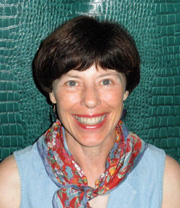GRISWOLD, Dr Kim
USA - Family Doctor

Dr Kim Griswold from the USA recently attended the WONCA Europe conference in Prague.
What work do you do now?
I work in a University setting, providing clinical care and teaching medical students and residents. Currently I am the medical director of an integrated primary care-behavioral health clinic, caring for an urban, under-served population.
Buffalo, NY in the USA, is a city with a long tradition of refugee resettlement, and for many years I have been involved in our local refugee communities providing care and teaching our students about the joy and value of working with diverse communities. In a recent project, colleagues and I hired refugees to work as standardized patients, or patient “actors”, to teach health trainee students how to work correctly with interpreters; emphasizing the importance of language, non-verbal cues, and cultural context. I also have a role at our “Center for Survivors” where with a group of medical students from the Jacobs School of Medicine (The Western New York Human Rights Initiative) and local physicians conduct forensic exams for refugees seeking asylum in the United States.
The academic mix of teaching, clinical work and research has been incredibly valuable to me; I feel that each aspect of my work has informed and enhanced the other. It has also helped me both to find wonderful mentors, and to mentor others. I have also been so fortunate as to work with two nurse practitioner colleagues for the entire 20 year span of my working medical life.
Other interesting things you have done (in brief)?
Medicine was a late career for me – I actually majored in Drama, and had a goal of being a professional actor. Science was challenging, so I took the option of a college course in “Alchemy”. Later, because of a family experience, I turned to nursing and then medicine. It was quite an experience coming late to those necessary science courses. Alchemy didn’t provide a lot of solid background. However, the story is fun to relate to college students who are considering careers in the health professions. I never did manage to turn dross metal into gold!
What is it like to be a family doctor in the USA?
Being a family doctor caring for our patients, and having the great privilege of sharing in their lives, is I think the same in the US as elsewhere. Our strengths as family doctors in teaching, mentoring, providing comprehensive care and learning to listen are universal.
But I find my greatest frustrations are about our US systems of care – a deeply fragmented insurance and payment system, and a lack of cohesive ideas and strategies. Much good research is being conducted around these issues, so I have hope that some of these challenges will be overcome in time. My greatest hope would be universal coverage.
What are your interests inside and outside work?
I especially enjoy and am passionate about working with students for global health equity and being a volunteer for Physicians for Human Rights. Animals are a large part of my life – I have 2 Labrador Retrievers (Hawkeye and Gemma) who are both therapy dogs, and trained to work with families in emergency situations; and two horses (Mikey and Harley), with whom I am training in dressage.